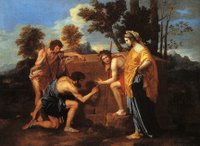 Good Fortune & Symbols
Good Fortune & SymbolsWhen I first started this blog, I wrote a brief explanation of why I named it "Et In Arcadia Ego". As you can tell from my subtitle and my profile blurb, I'm not exactly enamoured with our modern age. The Arcadian ideal is of a pastoral relationship with the land; of a simple and elegant existence focused on small, natural communities based around the family, and a beneficient stewardship of the land. At the same time, however, I recognize that the prior age which I look back too was far from perfect. In the painting on the right, Nicholas Poussin has inscribed upon a tomb the words "Et In Arcadia Ego" meaning "And I too was in Arcadia". The speaker is Death.
So much I was striving for when I first named this blog. But shortly after, it was pointed out to me that the first book of the Catholic classic Brideshead Revisited is entitled "Et In Arcadia Ego" as well. This connection manages to infuse some Englishness as well as buttress the original meaning.
As fortunate as I was in my blog name, I also managed to find good fortune in symbols when I bought a necklace. I added a crucifix and an old miraculous medal, but decided to keep the original fleur-de-lis ornamentation as well, thinking it a nice connection to pre-revolutionary France and my countrymen in Quebec. As a friend pointed out, however, the fleur-de-lis is also a symbol for the Blessed Virgin Mary.



3 Comments:
Just last week I was wondering about your blog name. Now I don't even have to ask. You read my mind. Thanks for the explanation.
It's interesting how God seems to make everything connect. He's pretty good at that. Ok, He's pretty good at everything. . .
The phrase is, of course, an element of Roman religious practice. Poussin is showing what you might find on many Roman gravestones. It reminds me of what the crown-bearer chanted into the ear of a triumphator: "Memento mori". It's sad that a culture that tried to remember that mortality was present in all worldly vanity and triumph, should have descended into the practice of deifying their eminent citizens.
I hadn't the faintest clue. Thanks very much.
Post a Comment
<< Home